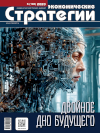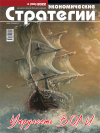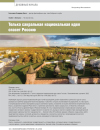Consolidating Meanings of the North Caucasus as a Factor in Protecting Russian Civilizational Code in Conditions of Cognitive War
DOI: 10.33917/es-6.192.2023.96-103
The authors present the results of the expert seminars of the “Meanings of the Caucasus” Laboratory” project on the development of consolidating semantic structures that are relevant for the youth of the North Caucasus Federal District. The key challenges in the cognitive sphere, that the civilizational identity of the multinational people of Russia faces in the North Caucasus, are examined.
The authors provide materials from expert discussions of possible options for countering existing threats through the search for consolidating meanings and practices in the following areas: historical memory, value system, image of the future. They identify key historical events and personalities whose activities have had a constructive, unifying character for the Russian Caucasus, and in modern conditions are positively perceived by the youth audience. The article also highlights value orientations specific to the North Caucasus, that correlate with the all-Russian system of traditional spiritual and moral values. An analysis of the honor codes that were in demand over three historical eras (Russian Empire, USSR, modern Russia) by residents of the North Caucasus with description of the common core of values is provided.
Conclusion is made about the need to promote the above described consolidating meanings through the existing publicinstitutions of the North Caucasus Federal District.
References:
1. Il’nitskii A.M. Mental’naya voina Rossii [Mental War of Russia]. Voennaya mysl’, 2021, no 8, pp. 19–33.
2. Magomedova M.A. Mezhetnicheskie konflikty i protivorechiya na Severnom Kavkaze v kontekste regional’noi bezopasnosti [Interethnic Conflicts and Contradictions in the North Caucasus in the Context of Regional Security]. Vlast’, 2023, no 2, pp. 72–78.
3. Starodubrovskaya I.V., Kazenin K.I. Severnyi Kavkaz: Quo Vadis? Ekspertnyi doklad [North Caucasus: Quo Vadis? Expert Report]. Moscow, 2013, 67 p.
4. Nadein-Raevskii V.A. Pantyurkizm: ideologiya, istoriya, politika. Ekspansionistskaya doktrina: ot Osmanskoi imperii do nashikh dnei i sud’by Turtsii, Rossii i Armenii [Pan-Turkism: Ideology, History, Politics. Expansionist Doctrine: from the Ottoman Empire to the Present Day and the Fate of Turkey, Russia and Armenia]. Moscow, Russkaya panorama, 2017, 316 p.
5. Ukaz Prezidenta RF ot 31 marta 2023 g. N 229 “Ob utverzhdenii Kontseptsii vneshnei politiki Rossiiskoi Federatsii” [Decree of the President of the Russian Federation of March 31, 2023 No. 229 “On approval of the Foreign Policy Concept of the Russian Federation”]. Ofitsial’nyi sait Prezidenta RF, available at: http://kremlin.ru/events/preysident/news/70811
6. Ukaz Prezidenta RF ot 9 noyabrya 2022 g. N 809 “Ob utverzhdenii Osnov gosudarstvennoi politiki po sokhraneniyu i ukrepleniyu traditsionnykh rossiiskikh dukhovno-nravstvennykh tsennostei” [. Decree of the President of the Russian Federation of November 9, 2022 No. 809 “On approval of the Fundamentals of State Policy for the Preservation and Strengthening of Traditional Russian Spiritual and Moral Values”]. Ofitsial’nyi sait Prezidenta RF, available at: http://www.kremlin.ru/acts/bank/48502





